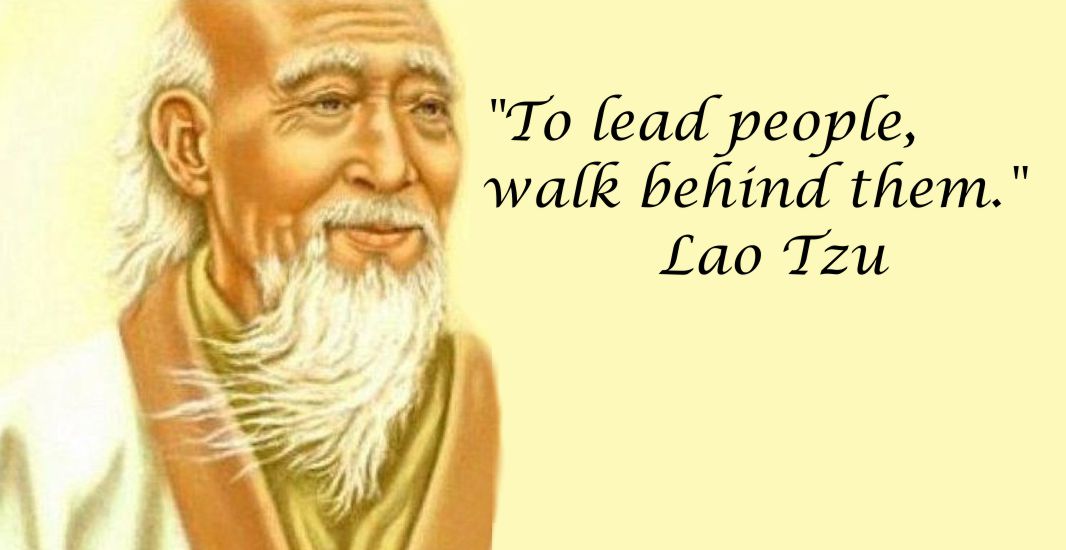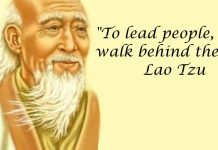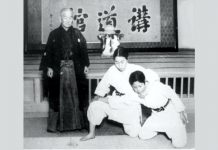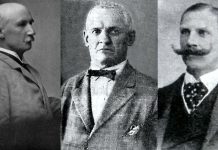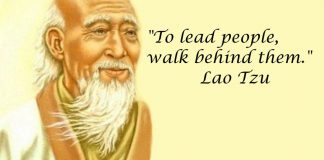To lead people, walk behind them. Lao Tzu
To maintain order in the smooth and efficient functioning of civilized society, it is preferable for one individual to be appointed as the supreme leader during his or her term of office. This person must hold a position that empowers him to wield authority, if need be, at all times. Basically, a leader unifies a group of people, selects a course of action, and directs them in pursuit of a predetermined goal. He may be leading the crew of a ship, a committee, a commercial enterprise, an army, or indeed nation. Requisites for such tasks are similar. The most fundamental requirement, however, is that he has to win the confidence of the majority of the group. Then he must gain their respect. Or maybe I should say earn it. The more esteem that he can command, the easier it becomes for him to secure their trust. But possibly his biggest challenge is for him to persuade his followers to do willingly whatever he so desires them to do. Very often though, this can be achieved only by resorting to the prudent use of the carrot and the stick.
Above all, a leader needs to be eloquent: he must be able to define his objectives clearly and motivate and inspire his followers to proceed to the right destination. Essentially, he has to convince his group that what he is proposing is indeed attainable. Throughout history there have been orators who have commanded tremendous power over millions of people, mainly because they knew how to enliven and persuade them: Oda Nobunaga (1534-1582) in Japan, Horatio Nelson (1758-1805), and later Winston Churchill (1874-1968) in England, Napoleon Bonaparte (1759-1821) in France, Fidel Castro (1926-2016) in Cuba, to name but a few. These men were leaders in mostly military endeavors. To lead successfully in such perilous undertakings is perhaps the most daunting and stressful of tasks for a leader to accomplish. Conversely, men such as Mahatma Gandhi (1869-1948) in India and Martin Luther King (1929-1968) in the U.S., were indeed competent and charismatic leaders of mainly peaceful revolts.
When a small boy faces a difficulty that he cannot cope with, he turns to someone for help. Usually that person is his mother. She can act in two ways; either by teaching him how to deal with the issue himself; or, by tackling the problem on his behalf. If, however, the child finds himself alone in such a situation, then he is probably afraid and upset. In adulthood this selfsame man facing difficulties that he is unable to cope with, is again troubled, but instead of crying, he normally complains and may seek to place whatever blame on others. He may, of course, turn to someone for help, and if assistance is forthcoming, that particular helper becomes in a sense his ‘leader.’ Should such a person on his behalf solve his problems, then he feels relieved and is no doubt appreciative. That person may be a surgeon, for instance, who successfully treats one of his family members. He is, naturally, grateful for perhaps saving the life of a loved one. In this case the surgeon is acting the role of the mother of his childhood. Therefore, his trust in this ‘leader’ figure will be heightened on such an occasion.
A society can be divided into two groups; namely, the leaders, and the led. In life there are times when, for one reason or another, a person must take on board the responsibility of leader. Whether he is happy to accept the burden or not, may be out of the question. The first-born child in a family often has to take on this role in the temporary absence of parents, say the eldest son, caring for younger siblings. He may lack confidence in doing so, but because of his seniority, he is expected to give them guidance and protection. Therefore, in life quite often people holding some authority are, as it were, pushed into a leadership role, especially so in some great national emergency.
A case in point occurred in the life of Dr. Shigeyoshi Matsumae an 8thdan in judo, who served as President of the IJF (International Judo Federation) from 1979 to 1987. Born in Kumamoto prefecture, Kyushu, Shigeyoshi Matsumae (1901-1991) in 1925 graduated from Tohoku Imperial University. An electrical engineer, he entered the Ministry of Communications and in 1935 invented the Long Distance Non-Loaded Cable Carrier Communication System. This system was apparently first realized between Manchuria and Japan. In 1941 Matsumae was appointed General Director of the Engineering Department at the Ministry of Communications. Very much an educator, in 1943 he established in Shimizu, Shizuoka Prefecture, his first school, one specializing in airplane technology.
On 6th August 1945 during the morning rush hour, an atom bomb was detonated at 8:15 a.m. by a US warplane over the city of Hiroshima, Japan, killing some 140,000 people, mostly civilians. To investigate the nature of this new type of weapon, Japanese government officials speedily formed an investigation group of technicians with Dr. Matsumae appointed as leader. The group’s mission was to fly to Hiroshima on 8th August and gather as much technical data as possible, in particular to measure the extent of radiation, then return to Tokyo and submit an official report. Despite being highly exposed to the dangers of radiation while in Hiroshima, Matsumae and his team worked feverishly. Matsumae took measurements of the deadly radiation throughout the devastated city. At each location the readings were far above normal. His duty was also to record relevant details of the horrifying widespread destruction and in doing so, he transmitted them to posterity. On 10th August he returned to Tokyo with the results of the investigation and duly submitted his report to the Emperor.
Similar to Jigoro Kano (1860-1938), throughout life Matsumae sought to promote the furtherance of education. In 1949 he opened his second school, one for wireless science in Nakano, Tokyo. These two schools were later amalgamated to become Tokai Science School and later still were expanded further to become Tokai University with Dr. Shigeyoshi Matsumae, the founder, assuming the post of President. In 1952 he was elected a member of the Lower House of the Japanese Parliament where he served for 17 years. In the year 1966 he founded a cultural exchange program the Nihon Taigai Bunka Kyokai. Matsumae established other schools and in 1970 founded the Tokai University European center in Copenhagen, Denmark. Later, in 1979, the Matsumae International Foundation was created.
It is clear that Dr. Matsumae understood the correlation which exists in the various fields of Japanese culture. In Japan unlike Europe, there is a relationship between the martial arts and culture, for both co-exists in relation to each other. This is one of the fascinating characteristics of the Japanese Budo tradition. In this regard, Dr. Matsumae, a judoman-scholar, wrote the following in 1979:
Towards a Greater Understanding of Japan and a lasting World Peace
I see the condition of the world today as consisting of conflict between the different national egoism. The Club of Rome has identified three crises that endanger the future of mankind: lack of energy, lack of food supplies, and burgeoning world population. Unless mankind learns to overcome these crises, there will be no lasting peace. The truth of the statement is undeniable, but in the conflict of national egoism that surrounds us today, the road to peace is still a long one. Therefore, we are called upon to do more than stand aside from the current of history.
In order for Japan to coexist peacefully with the other nations of the world and to facilitate the tasks that await our young people in the 21stcentury, we are now trying to prepare a forum for Japan’s international activities. In this way, I believe, we will be able to open up a path to the future that will preserve our nation and mankind.
Following the tragic experiences of the Second World War, Japan firmly resolved to reject all attempts to enhance national prestige by force of arms and instead to follow a policy of peaceful reconstruction as an industrial nation. More than thirty years have passed since then, and it is now a fact that considerable friction has arisen between Japan and several foreign countries, especially in the field of trade and economics.
We Japanese are now making earnest efforts to face up to this problem and are studying how to open a path to peace and prosperity on the basis of mutual understanding. My search of enduring peace and friendship among all nations of the world and for an effective reminder of the path to which we, as a peaceful nation are committed, led to the decision to create this Foundation.
As will be clear from the statement of the purpose of the Foundation, I hope to invite active young research workers of outstanding character, without regard to sex, race, religion, ideology or nationality, to Japan. By deepening their understanding of Japan, and establishing links of trust and friendship, I seek to make a real contribution to permanent peace throughout the world. I shall therefore welcome from the bottom of my heart applications from promising young men and women who sympathize with our aims and wish to undertake research in Japan.
At this point let me acknowledge the deep impression made upon me at the time of the establishment of the Foundation by the inspiring ideals and practice of the Alexander von Humboldt Foundation, which operates under the sponsorship of the Federal Republic of Germany, and the far-reaching influence it has exerted. I would like to take this opportunity to express my deep gratitude and at the same time to say that I intend to make every effort to accomplish the purpose and mission of the Foundation.
Dr. Shigeyoshi Matsumae
Tokyo, Japan
June 1979
About Trevor Pryce Leggett
Leggett (1914-2000) was born in London. He graduated from London University and came to Japan in 1939 as a member of the British Embassy. He was graded 6th dan in Kodokan judo and 5th dan in Shogi (Japanese chess). After World War II he worked as Head of the Japanese Department at the BBC, London, for 24 years. In 1983 Dr. Matsumae (1901-1991) invited Leggett to meet him in Tokyo in order to discuss ‘World Peace Through the Internationalization of Japanese Budo.’ This discussion was published in the October 1983 issue of the monthly magazine Bosei. I have here transcribed their intriguing comments.
Promotion of International Friendship through Budo
Matsumae: I must confess I am not a specialist of Budo, or of the Japanese traditional martial arts. However, I am very fond of judo and have been dedicating my life to it. I have trained, by means of judo, not only my body but also my spirit, and this so far has supported my life.
Now I am undertaking the position of President of the International Judo Federation. This is because I believe that we should make more efforts to spread our judo to every part of the world. As you well know, judo was initiated by Mr. Jigoro Kano and has been refined in Japan, and I think it is now about time for judo to be internationalized.
I am hoping not only to spread judo more widely and substantially, but also to contribute to the attainment of world peace through judo. People in different countries often come into conflict with each other over disparity of political interests, but they can enhance mutual friendship through sports. This is how Budo or sports can play an important role in the world.
When I made a tour of judo in European countries, as leader of a group of judo players from Tokai University, I asked the judo instructors of those countries why they were promoting judo. Almost all gave me the same answer: ‘Japan rose from ruins right after the end of World War II, and in a very short time became prosperous with tremendous economic power. Why was it so? What is the reason of her vitality? It must be something that only exists in Japan, not in Europe – it must be the Japanese Budo. The spirit of Budo must have generated her national power of reconstruction.’ From this viewpoint, they have introduced the spirit of Japanese Budo, and judo, aikido or the art of self-defense, and karate or the Ryukyuan art of self-defense, all of which have become popular very rapidly in European nations.
In the course of dissemination, a problem arose: that is, the quality of instructors sent abroad from Japan. Firstly, they had little knowledge of the language of that country. Secondly, they have acquired neither good sense nor manners. For example, they are insensitive in roughly flinging down the judo instructors of foreign countries in the presence of many spectators. No matter how strong they are, they should avoid doing this. They are in need of basic attitude as international judo instructors. How to solve this problem was one of the main subjects of our frequent discussions.
Such conditions convinced me that we need well-qualified, internationally-minded instructors, who are familiar with the history, culture and life style of the various nations of the world and who have working knowledge of the relevant foreign language. I made up my mind to train such Budo instructors. They must acquire the spirit of budo, starting with a salutation and ending with salutation. They must also receive education in both international common knowledge and foreign languages.
Therefore, I proposed to establish the International Budo University. I was very happy to find that this idea was heartily supported by many people. Japanese business circles contributed to the fund the Ministry of Education approved it as an authorized university. It is now under construction in Katsu-ura in Chiba Prefecture, a city on the Pacific coast to the east of Tokyo, and it will be inaugurated in April of 1984.
I am also going to open a Budo Center in Vienna. It was the City of Vienna that suggested this idea. They offered 33,000 square meters of land for its site. I accepted this proposal with pleasure and the construction will be completed in autumn of next year (1984). We will provide there Budo training such as judo, kendo or Japanese fencing, karate, aikido and naginata or Japanese halberd for women. In addition, we will teach some of our cultural heritage, such as flower arrangement, tea ceremony and Zen. I want non-Japanese people to learn as many good aspects of our tradition as possible, because I believe that is how international cultural exchange should take place and how international friendship should really grow.
Leggett: So, you are going to open the International Budo University in Chiba Prefecture, Japan, and Budo Center in Vienna, Austria. I really wish too, that foreigners would learn not only the arts, but also the spirit, the nucleus of Budo. What I regret most is that people outside Japan cannot learn the spirit of Budo no matter how deeply they are interested in it, because they don’t have the relevant materials written in English or German.
They, especially students, might easily become frustrated if they only learn techniques, without the intellectual approach provided by written materials.
Matsumae: I can understand that. It is not easy to operate a university with Budo as its core, even in Japan. This is the very first attempt. However, we are going to meet the challenge with a comprehensive approach, including ethical, historical and philosophical studies.
Understanding of the Budo Spirit and Japanese Culture
Leggett: These days we can see many Japanese specialists ins tructing judo in foreign countries, and I quite agree with you on the point you mentioned a little earlier. But here I would like to refer to Mr. Kisaburo Watanabe, who was the national coach of judo in Britain for three years from 1961 and who is now the Head of the Promotion Department of the Nippon Budokan: (Japan Budo Center). He stayed in my house. Every morning he went to a well-known school to learn English, and taught judo in the afternoon. He tried very hard and acquired sufficient ability of English to understand British culture and to write about judo in English.
He was a diligent and competent man, but many others are not.
I must point out that most of them lack the knowledge of their own culture and history. We foreigners are very disappointed by that.
We do not expect, or want, Japanese judo instructors to learn Shakespeare before they go to Britain, but they do need to learn Japanese culture, history and classics.
Matsumae: That is quite true. The Japanese are all supposed to read their classical literature such as ‘Heike Monogatari’ The Tale of Heike and ‘Makura-no-Soshi’ The Pillow Book. But actually, most of them don’t. Japanese with an inadequate knowledge of the culture of his own country cannot pass as an international man in the world.
Leggett: I read Shakespeare in school, to be sure. But I must confess I just gulped it down. Then I went to live in Germany, and found the German people asked questions about Shakespeare. Such experiences compel us to learn more about Shakespeare, and enable us to appreciate the treasures of our own tradition.
Matsumae: That is the same with us Japanese. We leave Japan and return appreciating the virtue of our own country, and are often awakened to a real understanding of our own tradition through the eyes of foreigners. This is true, but it is before going abroad that all our instructors ought to learn Japanese history and culture to a certain extent at least.
The Combined Spirit of the Sword and the Pen All Over the World
Leggett: Are you going to teach the Japanese language in the Budo Center in Vienna and in the International Budo University in Chiba Prefecture?
Matsumae: Yes, we have that intention.
Leggett: I would like to suggest you teach calligraphy, too. I trained myself in judo, and I also learned the Japanese language, together with Chinese characters. My teacher, who was working for the British Embassy, was very good at calligraphy. He taught me calligraphy in association with the spirit and attitude of judo. For example, he told me to write characters not using merely the hand or arm, but by using the whole body as we do in judo. I was much interested in his teaching, and I became aware of the correlation which exists in various fields of Japanese culture.
Matsumae: In the Nippon Budokan, we are trying to relate Budo to culture, as we call it the correlation of ‘the sword and the pen’. As one of such efforts, we hold the annual event of ‘New Year Writing’ when some 6,000 participants gather from every part of Japan from children of four or five years old to men of seventy years or so get together from every part of the country, as soon as the New Year starts.
Leggett: In Europe, there is no relationship between the martial arts and culture. But in Japan, both arts have co-existed in relation to each other. This is one of the finest characteristics of Japanese tradition. I believe the combined spirit of ‘the sword and the pen’ will make a great contribution to enrich world culture.
Matsumae: That is a very important point you mentioned. We have never had such an objective way of looking into ourselves.
Leggett: Foreign judo lovers are very interested not only in the art but also in its spirit, which is deeply rooted in Japanese tradition
We know that you have placed great emphasis on the spiritual side of Budo. So, it would be very nice for us if you could publish a translation of ‘Hiden-sho’, or the books of secrets of Budo. I have never seen a biography of Mr. Kano published in English. He is so familiar to us that we often associate the word ‘Japanese’ with ‘Jigoro Kano’. I have read several times his prefaces in the magazines of the Kodokan Gymnasium. They are short but very stimulating. Maybe you could also collect these and publish them in translation.
Matsumae: That is true and it is up to us to publish it and we will do our best. Indeed, we are inclined to overlook the important points which are close at hand.
Leggett: When I went to a judo hall in Japan for the first time, I saw the players exchanging bows before and after randori, or free practices regardless of their ranks, even between a high grader and a beginner. It was a wonderful sight. I was deeply impressed. It can never be seen in Western sports.
Matsumae: We do have the spirit of respect in Japanese Budo.
Leggett: Right, but I notice that nowadays they make the bow standing. They used to do it from sitting, didn’t they?
Matsumae: Yes, you are right. Judo has changed since it became popularized in Europe. The original ways of judo have been disappearing since then. It seems to me a great loss. I miss the seated bow very much.
Leggett: It reminds me of what happened to judo when it was first introduced to Europe. In France, it was proposed to translate all the technical terms of judo. For instance, Harai-goshi, or sweeping loin, was to be ‘No. 7 loin’ and Hane-goshi, or springing loin was ‘No. 8 loin.’ I strongly opposed this idea. I instanced the terms of music which are all in Italian. Italian words such as ‘allegro’ and ‘sonata’ are used everywhere. Western music originated in Italy. Judo originated in Japan. So, it is only proper to use the Japanese words in the field of judo. I insisted on that and in the long run they agreed with me. So even in Europe, a judo match is begun with the command Hajime! (or Begin!), as you do here. Of course, it is pronounced with a Western accent, but it is very important to observe this rule.
We are very interested in the spirit of judo. In competitive sports, winning or losing is almost everything but in judo there is a spirit of generosity. In Britain we make it a rule to meditate for two minutes after practice, which is well-liked. In Japan, however, such a custom seems to be disappearing. I regret this. Isn’t it a great loss?
Matsumae: Quite true. It may not be easy but we should try to maintain our precious tradition as much as possible. There is much we can learn from you! You are looking at very important points from outside Japan. Indeed, you seem to have mastered Japanese Budo more than we have.
Leggett: Your tradition is still alive. And I don’t think it makes any sense to adapt it to a foreign climate. On the contrary it can be harmful sometimes. What we want to learn from you is something genuine, what still survives in the Japanese tradition.
Spreading Friendship Through Judo
Matsumae: I had a lot of matches when I was young as everyone did in our apprentice days. There were some strong players in our rival school, and I fought against them, burning with a fighting spirit. Sometimes I won and sometimes they won, and as we grew older, our relationship grew more and more friendly.
Leggett: That is the real judo spirit.
Matsumae: One incident made me convinced of their real friendship. When I grew older, World War II broke out. I opposed the war and joined the movement against the Tojo Cabinet, the militaristic government of those days. I was then a Bureau Chief of the Ministry of Communications, but I was sent to the Philippines as a private soldier. I feel grateful every time I recall some of my friends – how they devoted themselves to help me out! They were my judo rivals with whom I fought with all my might in my youth. They made every effort to save me at the risk of reprisals against themselves from authority.
Leggett: That kind of story can only be born, in a sense, within the background of judo. It is a really interesting story. To my regret, however, we have very little chance to hear or read of such anecdotes concerning judo, because we lack translations.
Matsumae: You must know that Mr. Isao Inokuma (Professor of Tokai University, who won the All Japan Championship twice and victory in the heavyweight class of the Tokyo Olympic Games). He had a match against a Soviet champion, named Kiknadze in the Tokyo Olympics. Through this match, they became friends. We were shocked when we heard he had been killed in a traffic accident. Mr. Inokuma paid a visit to his grave, visited the bereaved family and held a judo match in memory of his friend, at which he presented a Kiknadze cup. Not only the district but the Soviet people appreciated it very much. Through judo, such a story is born.
I think that kind of friendship is one of the features seen in judo. In kendo, a bamboo sword is used. It is, in a sense, a medium between two players. In baseball, a ball and a bat are the media. They do not have such direct contact of bodies as we do in judo. I need hardly mention such individual sports as running and golf. In judo, we contact the opponent physically. I believe a sort of naked human feeling develops in it.
Today, Mr. Leggett gave me some very good suggestions. We should not neglect the good things in our tradition but positively show them to the world with confidence. We should not indiscriminately follow the Western civilization. We have the ability to imitate technology and industry but we cannot imitate culture and spirit. We should make further efforts to spread Japanese culture to the other parts of the world, not from an egotistical standpoint but from the universal humanistic point of view. I want to express my gratitude to Mr. Leggett, and I promise to do my best in this work as much as possible.
Shigeyoshi Matsumae went on to establish throughout the world a large number of educational cultural exchange programs with universities. For his life-long efforts, Dr. Matsumae received numerous honorary degrees from universities in various countries. He died in 1991 at the age of 89.
A leader has at times to show courage, as in the case of Dr. Matsumae facing great danger in Hiroshima in 1945, many though, are reluctant to take on the duties of leadership, for they know that if things go wrong and the frustration of their followers escalates to outright anger, then it is the leader who is most likely to be blamed and incur their wrath. A leader is, therefore, constantly worried for he is frequently called upon to make important decisions. When he is proved right, few complain. But when proved wrong, or if his group is unsuccessful in any endeavor: and even if he is innocent of culpability, nevertheless, he is the one who must accept the consequences, which often means the vengeance of his followers, and especially the fury from rivals. Thus, all leaders sooner or later learn this truth from the words of William Shakespeare (1564-1616): Uneasy lies the head that wears a crown. (King Henry IV, Part II, 1597)

